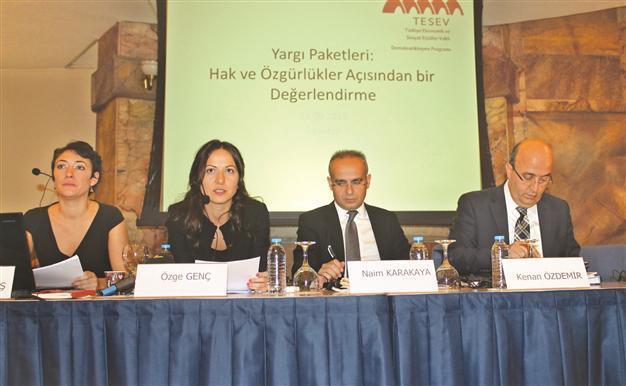Turkish government’s judicial packages fail to transform system: Report
ISTANBUL – Hürriyet Daily News

TESEV’s Democratization Program Coordinator Hande Özhabeş (L), program director Özge Genç ( 2nd L), a legist Naim Karakaya (2nd R) and Ministry of Justice Deputy Secretary Kenan Özdemir (R) have attended the meeting to announce the judicial reform report yesterday in TESEV’s Istanbul office.AA photo
Judiciary reform packages introduced by the government over the past two years have failed to change the problematic structure of the Turkish judiciary system and remained only as a cluster of legal revisions, a recent study conducted by the Turkish Economic and Social Studies Foundation (TESEV) has stated.“It would not be wrong to say that the judiciary reforms are intra-system revisions rather than a reform aimed at transforming the system,” said the report published ahead of the announcement of a new package, the so-called “democratization package” on Sept. 30.
TESEV’s “Judicial Packages: An Evaluation With Respect to Rights and Freedoms” report, which examined the four judiciary packages instituted by the government with the intention of enhancing Turkey’s judiciary institutions and structure within the European Union adaptation process, praised the rehabilitative amendments in the packages but found that these needed to be supplemented in order to be effective.
The packages were intended to bring in new regulations to enable harmonization with the judicial practices of the European Convention on Human Rights and European Court of Human Rights, but since the introduction of the first package in 2011, they all disappointed the public in several respects.
These revisions were expected to remedy a number of laws and legal practices that load the dice against the minorities, particularly the Kurdish minority, in the country.
However, the exclusion of the public – the addressees of the system – from the preparation of the packages process and a divergence in execution of the laws due to judges and prosecutors who tended to keep some of the problematic practices unchanged, caused the impact of the amendments to remain limited and weak, according to the report.
In terms of freedom of opinion and expression, the packages, particularly the fourth one legislated in April, has introduced a number of steps toward the elimination of problematic clauses and practices.
For example, some articles of Anti-Terror Law (TMK) and the Turkish Penal Code (TCK), which are all related to the creation of propaganda for terrorism and terror organizations, were amended in a way that limits the scope of propaganda crime. Yet the amendments were not sufficient for the release of KCK convicts, as expected prior to announcement.
The fourth package also paved the way for defense in any language in which one feels comfortable, but only under limited conditions.
TESEV’s report argues that the TMK’s existence in itself constitutes a violation of human rights principles, and therefore without its abrogation it would be hard to change the overall mentality of the legal institutions for the better.
The packages were publicly criticized for bringing in heavier clauses to limit freedom of expression instead of expanding it and keeping the ambiguous phrases unchanged, the report read.
Unfair hearing conditions and protracted imprisonment durations, the Turkish legal system’s much-criticized weak points, were also intended to be rehabilitated, but the report claims that the judge and prosecutors’ approach once again hampers the righteous practice of laws.
TESEV says the Supreme Board of Judges and Prosecutors (HSYK) has a key role to play in ensuring judicial independence and effective implementation of reforms.
















